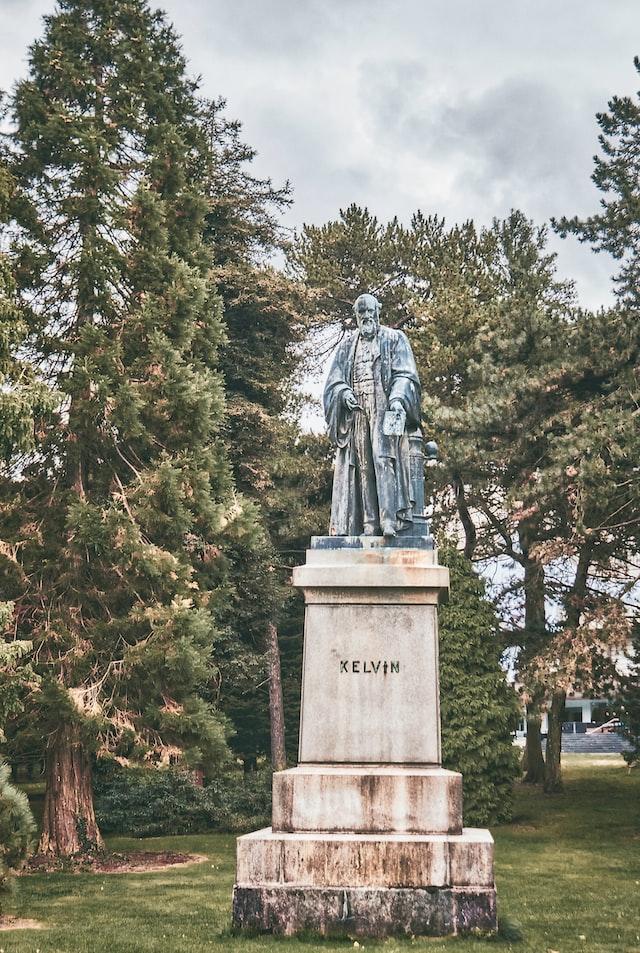By Curt Blattman of Bible Apologetics
In today’s Part II of this devotion, we will explore the lives of two more great Christian scientists and their love of the Lord and the Bible.
Lord Kelvin
Lord Kelvin (1824 – 1907) was elected at age twenty-two as Glasgow University’s youngest professor ever. Few know, however, that it was his habit t o open every one of his lectures with prayer to God.
o open every one of his lectures with prayer to God.
Most lists of the ten greatest scientists of all time would have to include William Thomson (Lord Kelvin). Born in 1824 in Belfast, Kelvin was a British mathematical physicist and engineer. Kelvin is world-renowned for helping to formulate in mathematical terms the first and second laws of thermodynamics, helped to unify the emerging discipline of physics in its modern form, and was instrumental in paving the way to lay the first transatlantic cable. His fame and accomplishments were so great that he became the first British scientist to be elevated to the House of Lords.
Kelvin strongly believed and followed the teachings of the Bible and found no conflict between science and the Holy Scriptures. In fact, Mulfinger writes: “Thomson said that people should not be so awed with the progress of science that they neglect to consider the impression that the study of nature ought to make on every mind. The more people study the wonderful works of God, he said, the more awe and veneration they should feel for its Author.”1
Kelvin strongly believed that as one studies science it should lead us closer to God. He once stated: “The more thoroughly I conduct scientific research, the more I believe that science excludes atheism.” He also added: “If you study science deep enough and long enough, it will force you to believe in God.”2
Near the end of his life Kelvin reflected on the awesome privilege of being able to use his scientific research to get a closer glimpse of God’s majesty in nature. To Kelvin science and creation were literally two sides of the same coin. He once commented: “The power of investigating the laws established by the Creator for maintaining the harmony and permanence of His works is the noblest privilege which He has granted to our intellectual state.”3
Johann Kepler
The name of Johann Kepler (1571 – 1630) may not be a household name to many of you, but in the world of astronomy his name is treated with reverence, since he is regarded as the father of modern astronomy. When Kepler was born the telescope had not yet been invented, (it wasn’t until 1609 that Galileo became the first person to point a telescope skyward) but that didn’t stop this remarkable scientific genius from searching the heavens and making one amazing discovery after another. Perhaps his greatest achievement was discovering the three laws of planetary motion and conclusively demonstrating the heliocentricity of our solar system. In addition, he is also considered the father of another scientific discipline – modern optics.
Sadly, many astronomers when they gaze into a brilliant star filled sky today don’t quite appreciate the divine Creator who placed all those stars in orbit as Kepler did 400 years ago. Many astronomers today are secular and don’t appreciate what we read in (Psalm 19:1): “The heavens declare the glory of God; the skies proclaim the work of his hands.” To Kepler the heavens, he believed, displayed a wonderful sense of harmony and he felt that God had given him a rare talent to find in mathematical terms the harmony in creation he so often meditated on when looking up into the heavens.
Kepler was a strong Bible believing Christian and he was careful to give God all the glory through his magnificent discoveries. In fact, he once said: “Since we astronomers are priests of the highest God in regard to the book of nature, it befits us to be thoughtful, not of the glory of our minds, but rather, above all else, of the glory of God.”4
As one studies the early history of some of our greatest astronomers, they will see that many of them had a reverence for the stars in heaven and just knew that an all-powerful and loving God must have put them in place. It is well known that Kepler when asked, when he was doing his astronomical researches, what he was doing, said, he was merely “thinking God’s thoughts after Him.” Of all the many great scientists of the past 500 years few have been as careful to give God all the glory for their talents and discoveries as Johann Kepler.
________________________________
1 George Mulfinger & Julia Mulfinger Orozco, Christian Men of Science. (Greenville, SC: Ambassador Emerald International, 2001), p. 161.
2 William Thomson, Lord Kelvin | CEH (crev.info)
3 George Mulfinger & Julia Mulfinger Orozco, Christian Men of Science. (Greenville, SC: Ambassador Emerald International, 2001), p. 178.
4 George Mulfinger & Julia Mulfinger Orozco, Christian Men of Science. (Greenville, SC: Ambassador Emerald International, 2001), p. 22.






